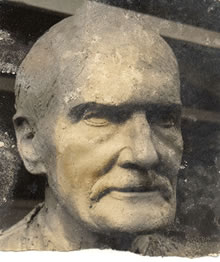 GILBERT MURRAY was Regius Professor of Greek at Oxford from 1908 until 1936. As well as a distinguished classical scholar, he was an original and active member of the Oxford Committee for Famine Relief, founded in 1942, which later became Oxfam. He was deeply affected by the First World War, and after it he became one of the leading figures in promoting world peace through the League of Nations.
GILBERT MURRAY was Regius Professor of Greek at Oxford from 1908 until 1936. As well as a distinguished classical scholar, he was an original and active member of the Oxford Committee for Famine Relief, founded in 1942, which later became Oxfam. He was deeply affected by the First World War, and after it he became one of the leading figures in promoting world peace through the League of Nations.
On Tony Harrison’s 2008 play Fram, in which Gilbert Murray’s role in the foundation of the League of Nations is a central theme, see the discussion by Rebecca Nemser in the journal Arion.
“I could not give up Greek; but for the rest I seemed to have no choice. I saw what War was; I saw many of my best friends and pupils killed in the flower of youth; I saw the cruelties, the lapse into barbarism, and the ultimate poisoning of all human relations that followed from the Great War. I had to give what powers I possessed to the movement for making secure some peaceful life for mankind, not merely avoiding war, but preventing war by the formation of a Society of Nations.”
– Gilbert Murray, speaking at a dinner held on 13 February 1936 in honour of his 70th birthday.
See also the recent interdisciplinary volume analysing all aspects of Gilbert Murray’s life and work, with contributions from a range of specialists in International Relations and Classics: Gilbert Murray reassessed : Hellenism, theatre, and international politics, edited by Christopher Stray.
On Gilbert Murray’s involvement in and thinking on world politics see Peter Wilson, ‘Gilbert Murray and International Relations: Hellenism, Liberalism and International Intellectual Cooperation as a Path to Peace’, Review of International Studies, 37, 2 (2011), 881-909, including further reading.
